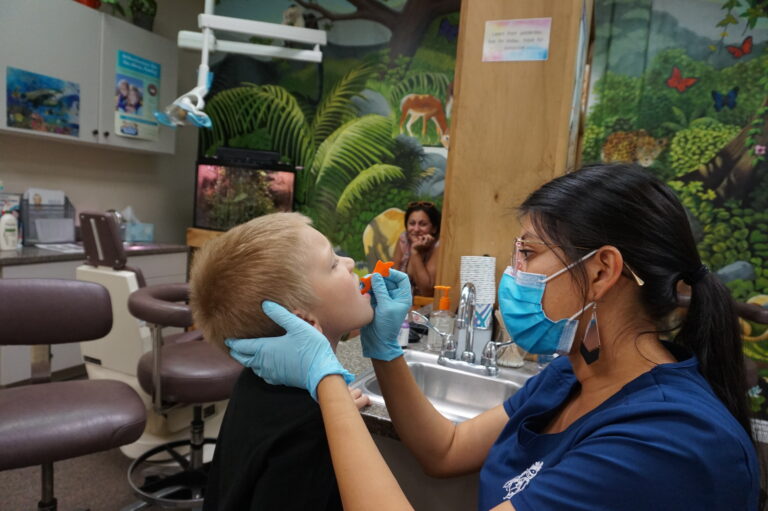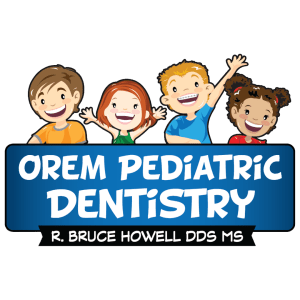FAQ
Questions / Answers
Checkout Frequently Asked Questions
At Orem Pediatric Dentistry, we know that some parents may feel nervous about having their child undergo dental treatments and procedures. However, you can rest assured that Dr. R. Bruce Howell and our friendly team have the experience and training needed to give your child a strong, healthy smile. If you still feel nervous, then take a look at the questions and answers below to learn more about your child’s oral health and what to expect when visiting our pediatric dentist in Orem, Utah.
When do my child's teeth first start to appear?
When your baby is about 4-7 months in age, then their primary teeth (also known as baby teeth) first start to erupt. This process usually begins with the teeth in the front of their mouth. The primary teeth help your child to eat, speak, and smile until their jaws are large enough to hold permanent teeth. When your child is about 6-7 years in age, their baby teeth will begin falling out, after which they are replaced with adult teeth.
When should I first take my child to see a dentist?
You should bring your child to our pediatric dentist by their first birthday. This may seem too early of an age for a dental checkup, but it is important to have a dental professional examine their oral health in order to ensure that their teeth are growing in correctly.
My child is suffering from teething pain. What should I do?
There is nothing worse than an unhappy child, and many children suffer from the discomfort of teething. You can soothe your child by rubbing their gums with a clean finger or cool spoon. A teething ring may also give your child relief. Feel free to call our office if you want to learn more about how you can help your child get through teething more comfortably.
Can I come with my child back into the treatment area?
We understand that children may feel a little nervous about being alone with strangers, so we welcome parents to come with their kids back to the treatment area. When your child grows older and develops a relationship of trust with our dental team, then we encourage parents to stay in the lobby in order to give your child a sense of independence and confidence.
Any Questions? Ask Us!!

We have several different finance options available to ensure your child is healthy and happy. If you need additional assistance with financing, please call us today. We look forward to meeting you and your family!
Questions / Answers
More Questions
What should I do if my child feels anxious about visiting a dental office?
For kids who experience dental anxiety or need to receive complex dental treatments, we offer a comfort menu or sedation dentistry if needed. These options help children feel more relaxed and comfortable during their visits.
You can help as well. Children feel less nervous if their parents treat dental checkups as an appointment to be excited about rather than something to dread.
Finally, can drop in one day just to say hello. Let your kids check out the aquariums and murals, and they’ll quickly see that our office is a fun place to be. (Call ahead to ensure you’re not visiting on surgery day!)
Does my child need to regularly visit a dentist even though their baby teeth are going to fall out anyways?
Absolutely! Your child’s baby teeth are crucial to their future dental health. Studies show that children who develop cavities in their primary teeth have a higher risk for tooth decay in their adult teeth. Additionally, your child’s baby teeth act as placeholders for the permanent ones, helping their smile to grow in correctly. Regular visits to a dentist are important because we make sure your child’s primary teeth are in good condition so they can have excellent dental health for life.
What are some common dental problems found in children that I need to know about?
- Baby Bottle Tooth Decay: Cavities can develop in an infant’s mouth because of their milk bottle. To avoid this problem, do not put sugary fruit juices or sodas in your child’s baby bottle and do not let them fall asleep with it. As soon as your infant’s first tooth comes in, start brushing twice a day.
- Bruxism: About 1 in 3 children will grind and clench their teeth at night. Most kids grow out of this condition, but if your child performs it chronically and suffers from tooth pain as a result, then you may want to bring them to our practice for a night guard.
- Early Dental Caries: Young, growing teeth are vulnerable to decay. Children are also more likely to eat sugary snacks and less likely to maintain a daily oral hygiene routine. We protect their teeth from cavities by providing preventive dentistry services as well as dental sealants.
